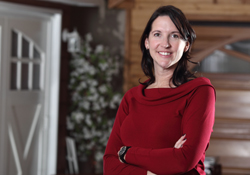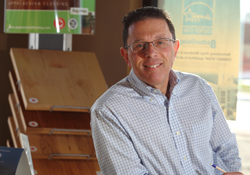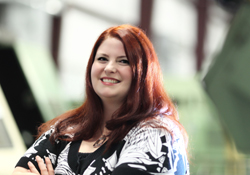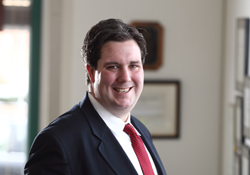Center for Entrepreneurial Leadership Helps Businesses Stay in the Family
By Cathy Wilde
Portraits by Tom Wolf
What defines a family business? It's a tricky question.
The truth is, family businesses are as diverse and varied as the world of business itself.
They can be as small as the "mom and pop" neighborhood store or as large as Wal-Mart, where Robson Walton, eldest son of Wal-Mart's founder, Sam Walton, serves as chairman of the board. They can be as high-tech as computer security or as basic as a bakery.

"The CEL program emphasized how important communication is among all the family members, both in and out of the business."
Jennifer Kuhn
Vice President of Marketing and Operations
Hamburg Overhead Door
But as soon as mom and pop start including son and daughter (or brother, sister, niece, nephew, grandchild, cousin...), you've got yourself a family business.
Whatever the size and whatever the product, family businesses have been the backbone of the American economy since Paul Revere took over the family silver shop. According to the Family Firm Institute, an international professional organization dedicated to promoting family business interests, family-owned businesses comprise 89 percent of all business enterprises in the United States. In addition, they account for 64 percent of the nation's gross domestic product and employ 62 percent of the U.S. workforce.
For nearly 25 years, the School of Management's Center for Entrepreneurial Leadership (CEL) has helped family businesses thrive.
"A significant number of the businesses we serve are family businesses," says Thomas Ulbrich, executive director of the CEL. "And an even greater number have the potential to become family businesses, as many of the entrepreneurs who have gone through our programs make plans to pass their businesses on to their children."
Nearly 800 alumni have taken part in CEL programs, such as the Core program, the Strategic Entrepreneurship (Advanced Core) program and the Allstate Minority and Women Emerging Entrepreneurs program (see below). These alumni employ more than 22,000 Western New Yorkers, with businesses worth more than $2 billion to the local economy.
"The CEL is an important link between the School of Management and the Western New York business community, of which family businesses play a huge role," says Arjang Assad, the school's dean. "We are gratified that so many family businesses trust the CEL as a means to help them build on their success."
Giving family businesses the tools they need
Most of the companies who pass through the CEL fit in the category of small businesses, which the U.S. Small Business Administration defines as independent businesses with fewer than 500 employees. The majority of family businesses also fit that description. The American Family Business Survey, conducted by MassMutual and the Raymond Family Business Institute in 2003, stated that the typical U.S. family business has 50 full-time employees, while only 6 percent report having 500 or more employees.

"Prior to CEL, I felt that I was on an island, with no real connection to people who would understand and assist me with these decisions."
Dominic Cortese
President/CEO
Cortese Brothers Construction
"In many ways, family-owned businesses are no different than any other small businesses," Ulbrich says. "They need the same tools to be successful. However, these businesses may need additional help dealing with the unique circumstances that can arise when family members work together.
"By working with mentors who have been through similar challenges, and with feedback provided by other participants in the program, the CEL can provide a safe environment for business owners to discuss these issues," Ulbrich says.
The small, personal nature of the Core program was a highlight to Jennifer Kuhn, vice president of marketing and operations for Hamburg Overhead Door, a business her father has owned for 21 years. "There were other second-generation businesses like ours, and it was a great forum to discuss and share ideas in a confidential manner," she says.
Kuhn went on to share some of these insights with her family. "The CEL program emphasized how important communication is among all the family members," she says, "both in and out of the business."
Over the past several years, the percentage of family-owned businesses involved with the CEL has been on the upswing. "This may be due to a generational shift," Ulbrich says. "Many companies founded by baby boomers are transitioning to younger members of the family. Business owners are seeking assistance in helping their companies survive for another generation."
Succession is a major issue
In fact, the number one issue that many of the family-owned businesses seek to address is that of succession. The 2007 American Family Business Survey, conducted by MassMutual and the Family Firm Institute, notes that while more than 40 percent of business owners expect to retire within 10 years, less than half of these owners have selected a successor.
This can create a number of problems, as new generations may have different ideas on how to run the business and who should be in charge.

"The program emphasizes the importance of working on the business, not just in the business, and on setting goals and vision for your company."
Jeanine Zaleski
Controller
Alliance Innovative Manufacturing
Such was the case with Kevin F. Overdorf, vice president of insurance agency Overdorf Associates, who came to the CEL with concerns about succession issues in the insurance business his father founded 24 years ago.
"I am one of eight children, yet only two of us work in the business," Overdorf says. "What I learned in the CEL program has allowed my father to feel comfortable with leaving the business to those working in it, because he has seen a major change in me in terms of confidence and productivity for the company." Overdorf says the program also helped him draft a succession plan to present to his father.
Dominic Cortese, president/CEO of Cortese Brothers Construction, also sought help for succession issues in his company, which had been founded by his father and uncle in 1951. When Cortese enrolled in the Core program in 2006, he was facing the difficult decision of whether he should attempt to buy out his cousin, who was part-owner.
"Prior to CEL, I felt that I was on an island, with no real connection to people who would understand and assist me with these decisions," he says. "The CEL connected me to people who could help me orchestrate this important transition. I thought it was going to be an insurmountable undertaking, but with the right direction from some key people, it was not as difficult as I expected."
After going through a stressful transition from his father's generation to his, Cortese is determined to make things smoother for the next generation. His two sons have management roles in the company, and a succession strategy for their eventual takeover of the business is already planned.
In this respect, Cortese is ahead of the curve. According to the American Family Business Survey, nearly a third of the businesses in their study had no estate plan beyond a will.
Mentors play important role
Cortese credits his CEL mentor, Joe Basil, of the Basil Automotive Group, for giving him sound advice on the succession issue. Mentors are a key factor in all CEL programs, and Ulbrich says a concerted effort is made to pair family business owners with mentors who also run family-owned businesses or who have extensive experience working with such businesses.
Jeanine Zaleski, company controller for Alliance Innovative Manufacturing, a precision machine and cutting tool services company, is another CEL graduate who benefited greatly from a mentor relationship. Zaleski attended the CEL Core program in 2010, along with her father, Richard St. John, company president.
St. John was already planning to transfer 51 percent of the company to Zaleski and her sister, Sarah St. John, when the pair entered the Core program. Serving as Zaleski's mentor was Laurie Irish-Jones, CEO of Irish Companies, a business that includes welding, carbonic and propane companies. "Laurie gave us good advice on how to get the ball rolling and get in contact with the right people so we could benefit from the opportunities available for women-owned businesses," Zaleski says.

"The CEL has made us more productive by showing me the importance of planning. We have put in place daily, weekly, monthly, yearly and long-range plans with tangible goals to keep us on track for growth."
Kevin F. Overdorf
Vice President
Overdorf Associates
These opportunities are increasing as female ownership of family businesses grows. The Family Firm Institute has seen a major increase in women-owned businesses. In the latest survey, 24 percent of the respondents had a woman CEO or president. This is a five-fold increase since the survey began in 1997. In addition, more than 31 percent of firms indicate they may have a female successor, and nearly 60 percent of all firms have women in top management team positions.
Zaleski highly recommends the CEL to other family-owned businesses. "The program emphasizes the importance of working on the business, not just in the business, and on setting goals and vision for your company," she says.
Kevin Overdorf agrees. Since graduating from the Core program, he has seen a nearly 15 percent increase in his company's sales. "The CEL has made us more productive by showing me the importance of planning," he says. "We have put in place daily, weekly, monthly, yearly and long-range plans with tangible goals to keep us on track for growth."
The type of growth, Overdorf hopes, that will ensure the family business continues for generations to come.
"Whether it's through planning, mentoring or providing sound business advice, the foundation of all CEL programs is building relationships," says CEL's Ulbrich. "Similarly, we know that relationships are a critical component in family businesses, which is why the CEL is such an invaluable resource."
Find the Fit for Your Family Business
Within its portfolio of entrepreneurship programs, the school's Center for Entrepreneurial Leadership (CEL) offers several that can assist family-owned businesses.
The Core program is designed for business owners whose organizations have progressed beyond the start-up phase of operation and who are interested in developing new opportunities and creating future strategies for their businesses. Meeting once a week during the 10-month program, Core participants are given the tools and resources to examine their entrepreneurial strengths and weaknesses while exploring strategies to overcome business challenges, create new opportunities and develop valuable networking relationships. This is accomplished in a confidential, noncompetitive environment with assistance from School of Management faculty, external business experts and fellow classmates.
The Strategic Entrepreneurship (Advanced Core) program is for graduates of the Core program, and provides a forum for continued leadership development. This 12-month advanced program offers participants a vehicle to integrate their newly gained knowledge into their business communities and enables them to regenerate their entrepreneurial passions. The hallmark of the program is its intimate size of no more than 12 participants from noncompeting companies. Participants serve as a personal board of advisors and business support network using peer-to-peer learning and "feet-to-fire" accountability.
The Allstate Minority and Women Emerging Entrepreneurs program is designed for minority and women entrepreneurs who wish to move their companies to the next stage of development. Candidates may have a business in the early stages of development or one that has survived over time but has not climbed to a more advanced stage. Each participant is assigned two mentors who are successful entrepreneurs from the local business community. Mentors provide protégés with technical advice on varied aspects of running a small business, including strategic and tactical thinking, marketing, long-range financial planning and basic legal advice to help protégés formulate realistic business goals and develop timetables and strategies for achieving them. This 12-month program is a joint venture by the CEL and the UB Center for Urban Studies and is sponsored by the Allstate Foundation, a charitable organization funded by subsidiaries of Allstate Insurance Corporation.
For more information about these and other CEL programs, visit mgt.buffalo.edu/entrepreneurship.
